- News
- Reviews
- Bikes
- Accessories
- Accessories - misc
- Computer mounts
- Bags
- Bar ends
- Bike bags & cases
- Bottle cages
- Bottles
- Cameras
- Car racks
- Child seats
- Computers
- Glasses
- GPS units
- Helmets
- Lights - front
- Lights - rear
- Lights - sets
- Locks
- Mirrors
- Mudguards
- Racks
- Pumps & CO2 inflators
- Puncture kits
- Reflectives
- Smart watches
- Stands and racks
- Trailers
- Clothing
- Components
- Bar tape & grips
- Bottom brackets
- Brake & gear cables
- Brake & STI levers
- Brake pads & spares
- Brakes
- Cassettes & freewheels
- Chains
- Chainsets & chainrings
- Derailleurs - front
- Derailleurs - rear
- Forks
- Gear levers & shifters
- Groupsets
- Handlebars & extensions
- Headsets
- Hubs
- Inner tubes
- Pedals
- Quick releases & skewers
- Saddles
- Seatposts
- Stems
- Wheels
- Tyres
- Health, fitness and nutrition
- Tools and workshop
- Miscellaneous
- Buyers Guides
- Features
- Forum
- Recommends
- Podcast
review
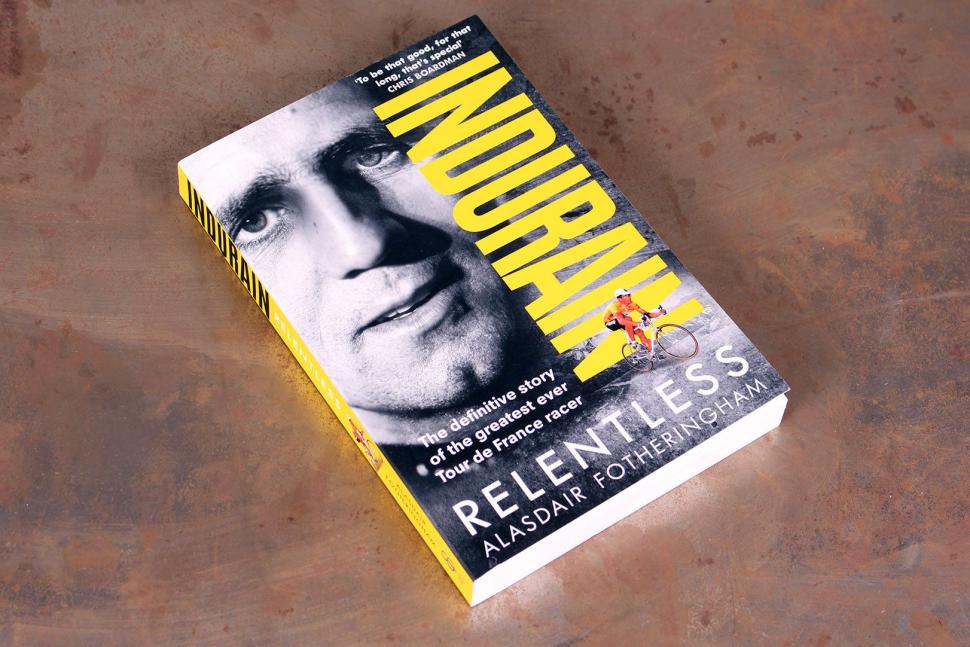 Indurain by Alasdair Fotheringham.jpg
Indurain by Alasdair Fotheringham.jpg£14.99
VERDICT:
A good but incomplete biography – still not the definitive Indurain story that we need
Weight:
447g
Contact:
At road.cc every product is thoroughly tested for as long as it takes to get a proper insight into how well it works. Our reviewers are experienced cyclists that we trust to be objective. While we strive to ensure that opinions expressed are backed up by facts, reviews are by their nature an informed opinion, not a definitive verdict. We don't intentionally try to break anything (except locks) but we do try to look for weak points in any design. The overall score is not just an average of the other scores: it reflects both a product's function and value – with value determined by how a product compares with items of similar spec, quality, and price.
What the road.cc scores meanGood scores are more common than bad, because fortunately good products are more common than bad.
- Exceptional
- Excellent
- Very Good
- Good
- Quite good
- Average
- Not so good
- Poor
- Bad
- Appalling
It seems only fitting that we review a book about Miguel Indurain just as Chris Froome closes in on some of the records that he set at the Tour de France. Indurain – Relentless, by Alasdair Fotheringham, may be one of the best books about the Spanish rider so far, but it is not as definitive as I'd hoped for.
Having spent over 50 days wearing the yellow jersey already, Froome is closing in on the 60 days that Indurain managed – although he won't get there this year. That would leave only Bernard Hinault (on 75) and Eddy Merckx (on 96) ahead of them both.
Indurain also stands as the last member to join the elite group of riders who have managed five wins at le Tour, joining Eddy Merckx, Bernard Hinault, and Jacques Anquetil. Froome is currently the best candidate to join the club next, but only Indurain can officially claim to have won five in a row – now that Lance Armstrong's results can no longer be mentioned.
Indurain was well known for being an undemonstrative and quiet individual, and that desire to keep his private life to himself seems to have continued after his retirement from racing – which is presumably why you won't find many books about the man. The Mousehold Press is a publisher of quirky cycling books, and seems to have done more than any other publisher by translating a couple of books about Indurain from Spanish into English: first there was A life on Wheels in 1998 (now out of print), and then A Tempered Passion in 2002; and the now defunct Cycle Sport magazine once produced a short book about him as part of a series of biographies about top riders.
Apart from that, I am not aware of any other books in English about Indurain, which is an extraordinary achievement for one of the Tour's greatest ever riders – and a source of frustration for those who want to know more about such an accomplished and respected rider.
Fotheringham seems to be the ideal candidate to redress the balance, having already produced biographies for two other important Spanish riders: Luis Ocaňa and Federico Bahamontes.
Fotheringham delivers a thorough account of Indurain's racing career, charting his long, steady ascent to the top of the sport, benefiting from the conservative (or even unadventurous) policy of rider management by his race teams.
It is possible that Indurain could have won the Tour a year earlier, because in 1990 'Banesto, quite simply, got the wrong leader'. The team remained focused on Pedro Delgado to win, with Indurain in support, even though 'the student had now begun to be better than the teacher'. Is that another experience that Froome has in common with him?
Fotheringham interviewed several key players from Indurain's career for the book: his brother Prudencio, team managers, teammates, and other riders all have something useful to say. The problem is that we never get to hear Indurain's views directly from the man himself, and find out little about his life beyond cycling. There are some quotes from various sources, but nothing new.
While this is little different to any of the previous biographies, it is a weakness in something claiming to be 'the definitive biography which gets to the heart of the enigmatic Miguel Indurain'. It is a well-written book about an extremely impressive cyclist, but it doesn't really move the game forward and give us the one thing that fans of Indurain would like: the thoughts of 'Big Mig' himself.
There are still many interesting insights into Indurain's career, including this example from a round of contract negotiations one year: 'Indurain refused [Zor] on the grounds that the 50 million pesetas he was offered by directur sportif Javier Minguez "was an awful lot of money": "I expected any answer but that one, and I didn't know what to say," Minguez said later.'
Later on, 'according to Unzué, when his own team offered him a contract, Indurain has been the only rider in their 36-year history who responded, "Wouldn't that be too much?"'
If Indurain's rise to the top was logical and steady, his retirement from the sport was unexpected and sudden, and was not handled in a way befitting a man of his status. It appears that relationships with the team had broken down, and he was made to do races against his will; as with so many of the stories I would love to hear Indurain's thoughts about this part of his career.
> 19 of the best books for all types of cyclists
Perhaps the beginning of the end came at the 1996 Tour de France, where Indurain's reign came to a dramatic end at the hands of Bjarne Riis. Fotheringham covers the many theories as to why Indurain did not perform that year, ranging from him being past his best at the age of 32, that the weather was colder than was ideal for him, or that racing later into the 1995 season had shortened his winter recovery period.
Surely the answer is that Indurain was up against riders that we now know to have been taking drugs? The podium that year comprised Riis, Jan Ullrich, and Richard Virenque.
Indurain himself seems to have avoided the allegations of doping that surround so many riders from that era, even though he did have 'a moment': he once tested positive for Salbutamol, 'a substance used to treat asthma and other breathing difficulties under the commercial name of Ventolin'. Apparently the race doctors had been informed and Indurain 'had the medical certificate from the UCI that authorised his use of Ventolin'. Similar episodes are still happening today, although public reaction seems to be rather different now.
We also discover that 'Indurain worked at certain points in his career with Francesco Conconi [and] Conconi's reputation is mixed, to say the least'.
I expected Fotheringham to have a lot more to say about this, as he has shown himself to be very knowledgeable about the use of drugs and the effect on cycling in a previous book. I don't think you can give a complete picture about cycling in that era without setting it in the context of increasing drug use – and this is another area where Indurain's comments would have been welcome.
Verdict
A good but incomplete biography – still not the definitive Indurain story that we need
road.cc test report
Make and model: Indurain by Alasdair Fotheringham
Size tested: Paperback
Tell us what the product is for, and who it's aimed at. What do the manufacturers say about it? How does that compare to your own feelings about it?
From Ebury Press:
Miguel Indurain is Spain's greatest cyclist of all time and one of the best Tour racers in history. He is the only bike rider to have won five successive Tours de France, as well as holding the title for the youngest ever race leader in the Tour of Spain. This is his story.
As the all-conquering hero of the 90s, Indurain steadfastly refused to be overwhelmed by fame; remaining humble, shy and true to his country roots. Along with his superhuman calmness, iron will-power and superb bike handling skills, he was often described as a machine. Yet 1996 saw Indurain, the Tour's greatest ever champion, spectacularly plummet, bringing his career and supremacy to an abrupt end.
In Indurain, Alasdair Fotheringham gets to the heart of this enigmatic character, reliving his historic accomplishments in vibrant colour, and exploring how this shaped the direction taken by generations of Spanish racers - raising Spanish sport to a whole new level.
Tell us some more about the technical aspects of the product?
Title: Indurain - Relentless
Author: Alasdair Fotheringham
Publisher: Ebury Press
Date: 25/5/17
Format: Trade Paperback
Pages: 314
ISBN: 9781785032059
Price: £14.99
Tell us how the product performed overall when used for its designed purpose
Good, but not as definitive as I'd hoped for.
Tell us what you particularly liked about the product
It is one of the few books about Indurain.
Tell us what you particularly disliked about the product
It is still not the definitive book I hoped to see.
Did you enjoy using the product? Yes
Would you consider buying the product? Yes
Would you recommend the product to a friend? Yes
Use this box to explain your score
Indurain's impressive achievements make for a great story, but without direct input from the man himself some questions remain unanswered.
About the tester
Age: 55
I usually ride: My best bike is:
I've been riding for: Over 20 years I ride: Every day I would class myself as: Expert
I regularly do the following types of riding: commuting, touring, club rides, sportives, general fitness riding
Latest Comments
- stonojnr 3 sec ago
theres an attitude I encounter alot locally, and demonstrated in bucket loads by drivers on my commute home tonight, that cyclists shouldnt be on...
- Griff500 17 min 43 sec ago
Three questions for the developer:...
- FionaJJ 20 min 13 sec ago
When I was a student it was virtually unheard of for someone to have a car. It wasn't even that it was considered a luxury that almost no-one could...
- Hirsute 39 min 1 sec ago
According to twitter @magistratesblog It's an obligatory disqualification, so it will have been made.
- RoubaixCube 1 hour 2 min ago
Could it also be that the victim didnt have valid insurance/driving license or M.O.T so didnt report it in fear of themselves being investigated???...
- Keesvant 1 hour 19 min ago
If the chains snap that is lack of build quality or material.....
- Hirsute 2 hours 15 min ago
"Wisdom is better than weapons of war, but one sinner destroys much good."
- Jaijai 2 hours 40 min ago
His life was only worth shy of 7 years ,that's too lenient in every book .Let alone drugged up and leaving him to die
- webbierwrex 2 hours 45 min ago
I came here to basically write the same thing, the floating bus stop near me has a very narrow cycling lane between a very narrow pavement and a...
- AS52 3 hours 8 min ago
It wasn't an official consultation meeting - see my comment above.
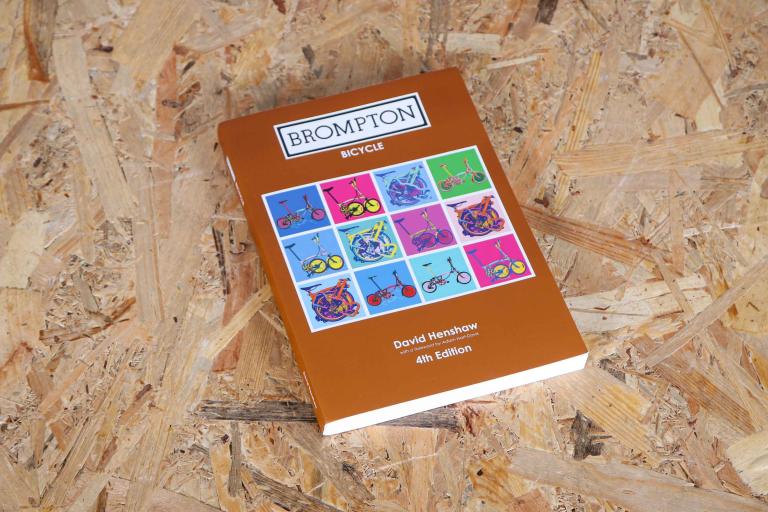
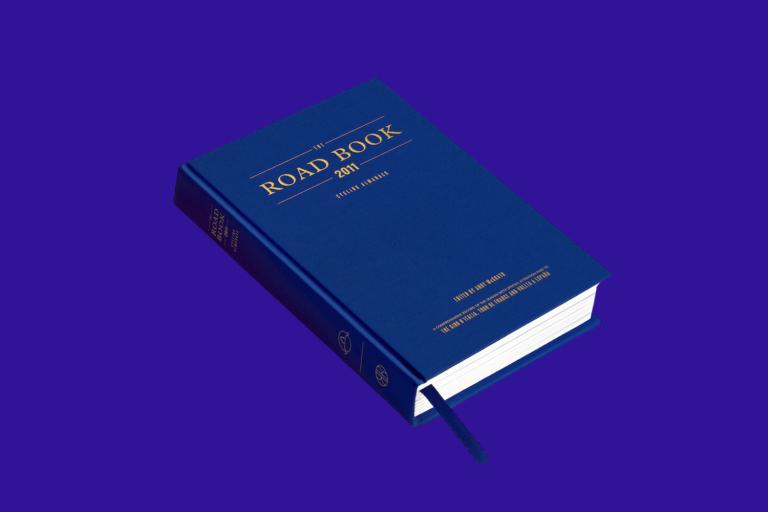
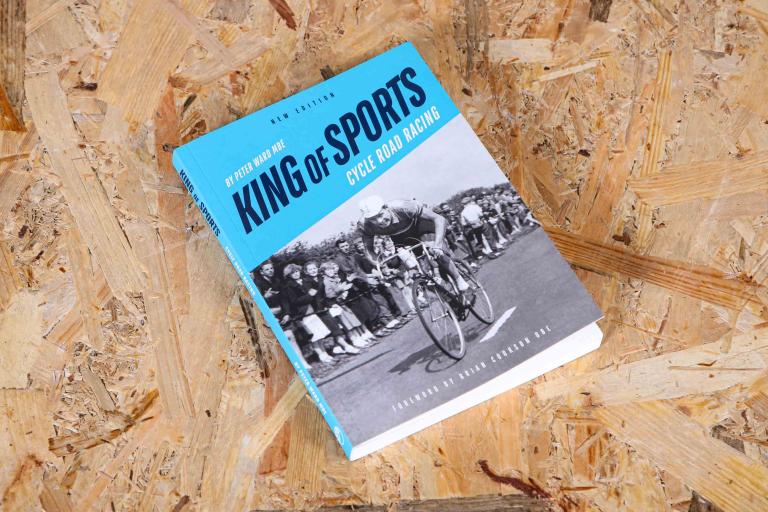
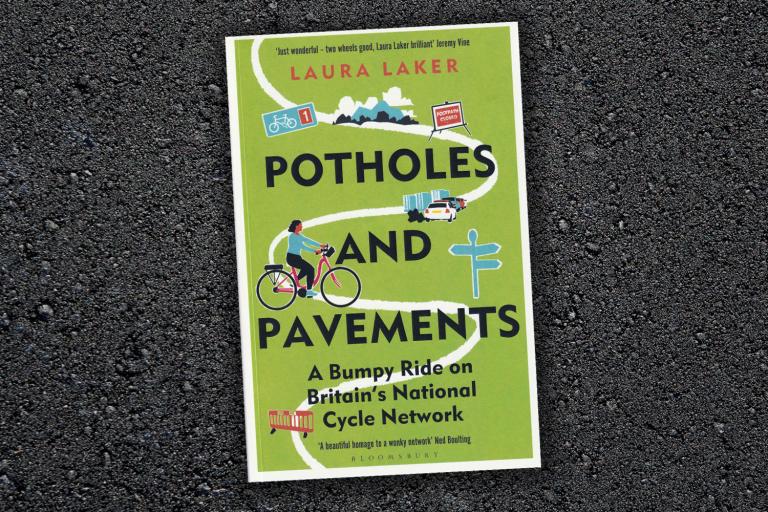
Add new comment
9 comments
Think we should rightly remove EM as the cyclist who has held the yellow jersey the most days if we are deleting Lance Armstrong's efforts. like Armstrong he was a doping cheat extraordinaire (having been busted 4 times in an era of limited testing), like Armstrong he denied doping, like Armstrong he was a bully.
Indurain's efforts were so far out the norm as to be utterly ridiculous.
Didn't someone analyse his efforts and one tour came out at a 455w average.
So that's a 455w average - 5-6 hours, every day - for 3 weeks - Ok.
exactly, decent pro rider turned into an all conquering GT winner who absolutely monstored time trails like he was riding in a vacuum. We're not talking short prologue's a la Boardman either. he did 505w for an hour on average only 3 weeks after finishing the TdF to get the hour record, that's even with his comparatively poor aero position and his 80+kg frame. He was so doped that in 1995 after doing a 1:04 54km time trail he ripped up the books and grabbed second in a very mountainous stage the following day essentially killing off the race that year as he took minutes out of his rivals and did the same again in stage 19, eventually winning by over 4.5minutes. just like EM and the rest he was a fraud on an epic scale.
I bet that's not in the book nor mention of his associates who had dealings with Dr.Ferrari.
I thought Froome had already won 5? 2012, 2013, 2015, 2016, 2017.
It takes less time to research this mistaken notion, than it did to post it. I guess that is supposed to be the job of the rest of us, now, but seems we should expect a bit more from other cyclists.
A joke too dry for you, Wigtard.
"Indurain himself seems to have avoided the allegations of doping that surround so many riders from that era"
LOLWUT?
These were the boring years of the TdF. He snuffed the life out of it.
I think I'll take a miss on this.
It's empty.
He was a hero to many and kept his head down for 20 years lest someone came knocking with a frozen sample.
Buy Herbie's Triumph and Tragedy at the Giro D'Italia if you want a good read.